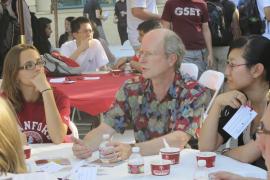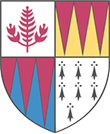
Graduate students are encouraged to seek out faculty advice in both formal and informal settings.
Faculty advisors play a crucial role in graduate students' intellectual development. Stanford and the VPGE office offer many resources to help faculty and students build advising relationships that are healthy and productive.
Every Stanford graduate student is expected to work closely with a faculty advisor who will assist them in planning a program of study. Students are also encouraged to seek out mentors in addition to their formal faculty advisor.
Successful advising and mentoring relationships are characterized by clear expectations, open communication, and a willingness to resolve problems. The programs and resources below can facilitate productive relationships between graduate students and their advisors and mentors.
Programs and Workshops
Setting Expectations and Resolving Conflicts with Your Advisor Workshop
Sitting down together to discuss and set expectations is an excellent way to create a solid foundation for both students and advisors. How to broach such a conversation, however, can be tricky. In this quarterly workshop, students will learn an interest-based approach to setting expectations and preparing for difficult conversations.
Management Matters
A three-session workshop focusing on simple principles and guidelines that, once learned, can make the process of managing others enjoyable and effective, and help you succeed in whatever career path you choose.
National Center for Faculty Development and Diversity
Through Stanford's institutional membership, all graduate students, postdoctoral scholars, and faculty have access to the National Center for Faculty Development & Diversity (NCFDD), which provides professional development, training, and mentoring resources that are broadly applicable across academic disciplines.
Individual Development Plans
Individual Development Plans (IDPs) help you assess your skills and progress, reflect on where you would like to be, and define specific actions toward achieving your goals. Using your completed IDP as a guide, you can discuss your self-assessment, goals, and plans with your faculty advisor. IDPs are recommended for all students funded by NIH, and are required for PhD students in the Biosciences.
Annual Doctoral Student Degree and Career Progress Meeting Worksheet
Students and postdoctoral scholars are encouraged to meet annually with their advisors to take stock, set goals, and develop an action plan for the coming year. This customizable worksheet, endorsed by the Committee on Graduate Studies, can help facilitate such conversations.
Biosciences IDPs
Doctoral students in the Biosciences should use the appropriate IDP form, tailored for students in Year 1, Year 2, and Years 3-5. Other students may find these forms useful to guide their own planning and discussions with their faculty advisor.
myIDP
This IDP, developed by Science Careers at the American Association for the Advancement of Science, is in use across the country by science students and postdoctoral scholars. All Stanford affiliates have free access to this resource by virtue of Stanford's institutional journal subsciption.
Postdoctoral Scholar Career Planning
Postdocs are encouraged to initiate a discussion with their faculty mentors around their career and progress. These forms, developed by the Office of Postdoctoral Affairs, offer relevant discussion points to facilitate such a mentoring conversation.
Planning and Discussion Tools
Guidelines for Good Practices in the Graduate Student/Faculty Advisor Relationship
Review and implement behaviors and practices that help students and faculty establish successful advising relationships.
Student/Advisor Expectation Scales
Use this tool to discuss, define, and align expectations in the advising relationship. This resource is not prescriptive: rather, it is meant to assist students and faculty in establishing clear and realistic expectations.
Additional Resources
There are many articles and tools available to help students and faculty build successful advising relationships.
- Download What Departments Can Do to Promote Successful Doctoral Degree Completion
- Download Resources on Doctoral Student Advising
Challenges and Conflicts
Even in the best advising and mentoring relationships, conflicts may arise. Take a proactive approach to resolving any issues that arise.



